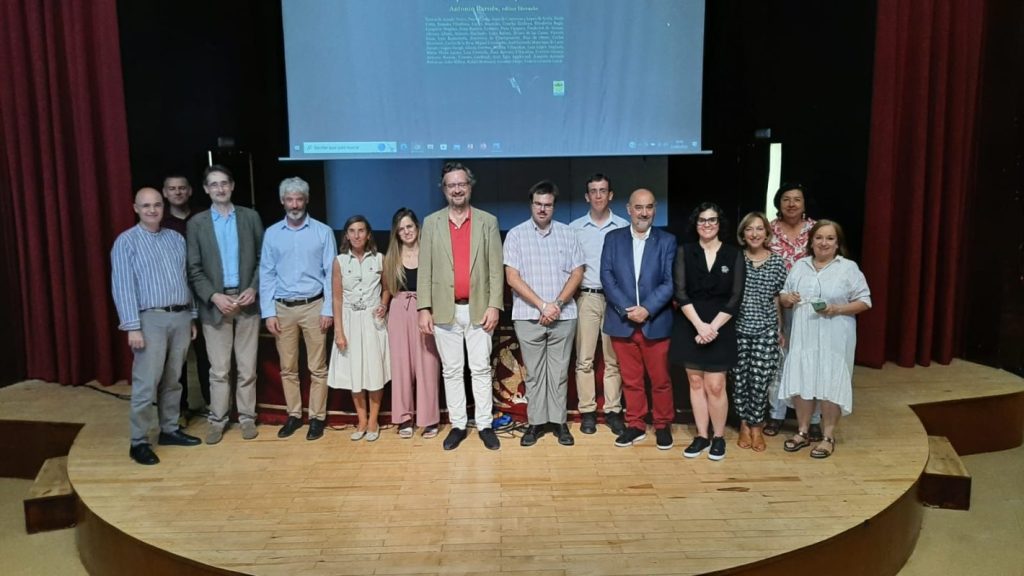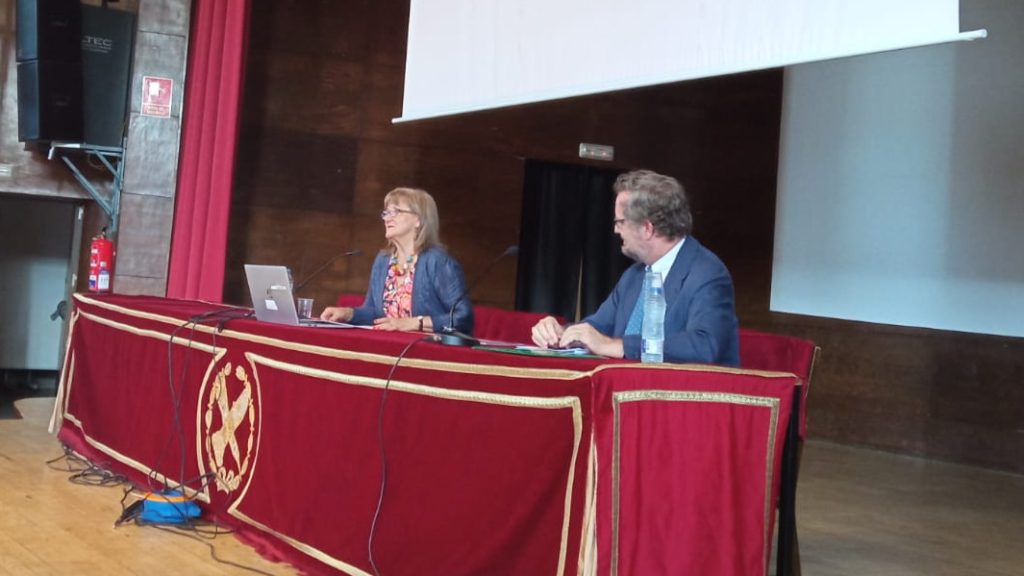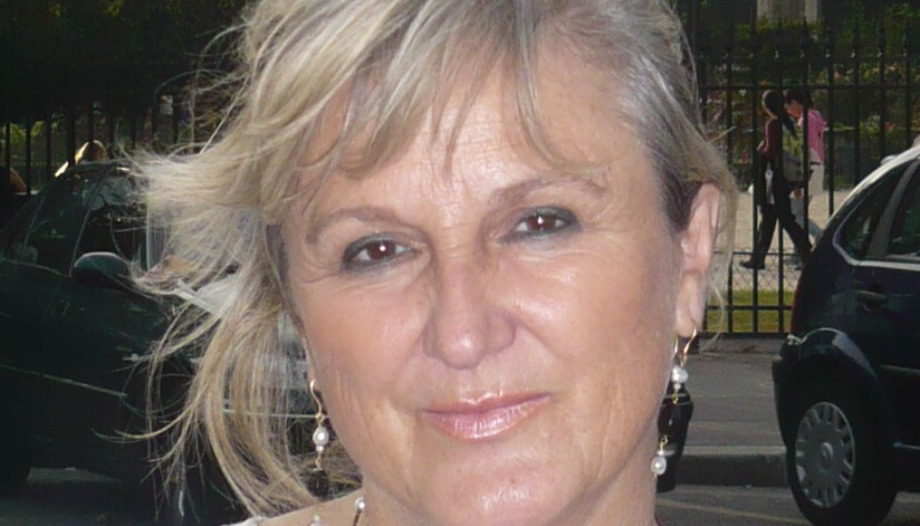María Caballero is Professor of Spanish-American Literature at the University of Seville. Her research in recent years has focused on essays on the identity of Hispanic New World countries, and on the writing of the self (diaries, autobiographies, memoirs...), with special emphasis on the writing of women. For decades she has been researching, as part of the writings of the self, in the literature written by converts, in the testimonies of that inapprehensible phenomenon that is the religious conversion of a human being.
He recently inaugurated the VI Congress of "God in Contemporary Literature: Authors in Search of an Author"held in the auditorium of the Complutense University of Madrid on September 22 and 23.

Your lecture has focused on writers who were converts in the 20th-21st centuries. Which authors seem most relevant to you?
Since Paul of Tarsus and Augustine of Hippo, the stories of conversion shake the reader who is numb in our daily world tinged with superficiality and activism. Two models of religious conversion come from them: the "tombs" not sought by the subject and catalogued as "extraordinary events" (Claudel, García Morente...). It is an obscure experience where intuition imposes itself: "God exists, I met him" -Frossard will say-. In this regard, the book by José María Contreras Espuny, "Dios de repente" (2018), is very suggestive and current.
At the opposite pole and led by Augustine of Hippo, would be the "rational" (Chesterton, Lewis), which culminate a search of years: the honesty of the subject ends up accepting the Truth of the Catholic God, not without resistance.
There are two books that are an unavoidable framework when studying these questions: "20th Century Literature and Christianity", by Ch. Moeller, in several volumes. And "Converted Writers" (2006), by J. Pearce, who restricts himself to the Anglo-Saxon world and works in depth on a good number of English writers whose testimonies of conversion are still captivating. Not to mention their novels and short stories that consecrate them as classics of the 20th century: Chesterton, Lewis, E. Waugh, or Tolkien are inescapable references, as shown by the long heritage of "The Lord of the Rings".
Ana Iris Simón, an author with a left-wing sensibility and heritage, is raising the question of God in her novel Feria and in her articles in El País. How do you assess this phenomenon?
Before her, Juan Manuel de Prada, who defines himself as a convert, did so in his time. In recent decades the market has been flooded with testimonial literature, not only memoirs and autobiographies ("best-sellers" of the moment), but also religious literature. The question of God is in the air, as evidenced by two little popular books: "10 atheists change buses" (2009), by José Ramón Ayllón, and "Conversos buscadores de Dios. 12 stories of faith from the 20th and 21st centuries" (2019), by Pablo J, Ginés. They are not, especially the second one, necessarily writers, but rather motley converts: the sister of Lenin's embalmer, a KGB prisoner, the inventor of the Kalashnikov rifle, León Felipe, republican and Spanish poet...
What works by recent converts are particularly interesting to you?
In the conference I did not limit myself to Spanish writers, but focused on the intellectual world, where the phenomenon of the search for a meaning in life, for a possible God, for something more... is obvious. In spite of living in an apparently postmodern and secularized world, there are more and more testimonies of converted writers, something that has become a kind of literary subgenre. After a few brushstrokes on converts from our Western world (E. Waugh, Mauriac, S. Hahn...) and from Islam (Qurehi, J. Fadelle...), I focused on five intellectuals with an international perspective and different backgrounds: A. Flew, S. Ahmari, J. Pearce, J. Arana and R. Gaillard. I worked on the conversion stories of the first four and a novel written by the last one.
Under the title "God exists. How the world's most famous atheist changed his mind" (2012), the philosopher A. Flew (1923-2010) explains the reasons for his change of position. A surprising 360-degree turn from his scientific work led him to affirm: "God exists... the universe without his presence is inconceivable": in fact, he does not opt for a specific god, but strongly affirms the presence of the sacred in the universe. His was a scandalous "conversion": dedicated to giving lectures and to carouse in spectacular and multitudinous round tables of scientists discussing the subject, he went from being the official atheist to upsetting his opponents with his affirmations.
"Fire and Water. My journey towards the Catholic faith" (2019) is the testimony of Sohrab Ahmari (1985), a famous columnist from Great Britain who in a tweet in 2016 announced his conversion to Catholicism, with great scandal in the networks. A foreigner living in the United States, he became a reader of Nietzsche beginning an intellectual and spiritual path that, years later and counterbalanced by the reading of the Bible, would lead to the Catholic Church. Not without first passing through Marxism. "I would come to the conclusion that the inner voice that encouraged me to do good and reject evil was irrefutable proof of the existence of a personal God," he would say.
As for J. Pearce (1961), he defined himself as a "militant racist fanatic" and the story he dedicated to his conversion, "My Race with the Devil" (2014), bears this subtitle: "from racial hatred to rational love", which leaves no doubt as to how a militant fanatic of the National Front who flirted with the IRA has seen his own conversion process. The reading of Chesterton, Lewis and the Oxford converts, heirs of the also converted Newman, will eventually lead him to God. Today he is an excellent writer and apologist, very focused on biographies of illustrious converts.
From Spain I chose "Teología para incrédulos" (2020), by J. Arana (1950), professor of philosophy at the University of Seville and member of the Royal Academy of Moral and Political Sciences of Madrid. Nothing could be further from a serious reflection on borderline questions of philosophy and theology, with a more or less apologetic intention.
The title is misleading if we do not understand that the unbeliever of whom he speaks is none other than the author himself and that the book addresses many theoretical issues -salvation and sin, freedom, miracles, Church and secularism, faith and science- with intellectual seriousness but always from the chronicle of his own existential journey towards a faith that comes for him from the family tradition, which is lost in his youth, although never completely in practice, faith and science - with intellectual seriousness but always from the chronicle of his own existential journey towards a faith that comes for him from the family tradition, which is lost in his youth although never completely in practice and is gradually recovered until it reaches its fullness in maturity, as the fruit of reflection and response to the grace of God. The landscape that this path traverses, in which many can recognize themselves, is that of our contemporary culture, that of the history of Western thought.
¿To what extent have such authors had or have a relevant role in addressing the question of God in public opinion?
What is the impact of statements by converts such as Messori or Mondadori? Texts such as "What do those who do not believe believe in?" (1997), a dialogue between Umberto Eco and Carlo Maria Martini, Archbishop of Milan, have brought questions related to faith to the fore. Now, the market, the media and the networks privilege and hide, as we all know... A few years ago two books by Alejandro Llano and Fernando Sabater were published almost in parallel on these issues and obviously the dissemination of the second one overwhelmed the first one.
¿And authors in other Latin American countries?
A couple of years ago I gave a lecture at the Center for Theological Studies in Seville, later published in the journal "Isidorianum" and posted on the networks. Under the title "Has God disappeared from our literature?" paraded Rubén Darío, and his poem "Lo fatal, Pedro Páramo", J. Rulfo in his existential search for the father (maybe God?), "Cien años de soledad", G. García Márquez with its biblical structure from Genesis to Apocalypse... and a few contemporary novels by Otero Silva ("La piedra que era Cristo"), Vicente Leñero, ("El evangelio de Lucas Gavilán") and others...
Among them all, the Argentine agnostic Jorge Luis Borges occupies a prominent place. In his poems, essays and even behind the suspenseful surface of some of his short stories ("Ficciones", "El Aleph") he hides existential questions about the being and destiny of man, the world and God, as Arana has studied in his book "El centro del laberinto" (The center of the labyrinth) (1999). A search that reaches his deathbed where he summons -according to the testimony of his widow María Kodama- a Protestant pastor and a Catholic priest to continue searching...
A year ago we had a debate in Spain about the little influence of Christian intellectuals in culture. Do you think anything has changed in this time? Are there "green shoots" in Spain or other countries?
There are "green shoots" and they are specifically surprising in a "secular" country like France. God and themes related to transcendence are of interest. The unusual success of Fabrice Hadjad (1971), French professor and philosopher, born of Jews of Tunisian descent. A convert himself, he has devoted his life to lecturing and writing books such as "The Faith of Demons" (2014) or "Be Successful in Your Death. Anti method for living" (2011); "How to talk about God today" (2013);)....
"Ultimas noticias del hombre (y de la mujer)",(2018) and "Juana y los poshumanos o el sexo del ángel", (2019) are some of the latest installments of this university professor and father of nine children, who has written almost twenty monographs and given conferences all over the world. They are written with an apologetic height, together with the nonchalance of one who lives according to that now old formula of 1928 endorsed by Vatican II: "to be contemplatives in the midst of the world".

Susanna Tamaro or Natalia Sanmartín are female voices that have had enormous success and communicate a very attractive Christian anthropology. How do you value the contribution of the female perspective?
It is plural and very rich with names such as Etty Hillesum (1914.1943) currently very fashionable and the subject of doctoral theses, who is part of a quartet of Jewish women and writers, killed in the Second World War along with Edith Stein (1891-1942), Simone Weil (1909.1943) and Anne Frank (1929-1945).
But not only them. At the opposite pole, the American Dorothy Day (1897-1980), was a journalist, social activist and American Christian anarchist Benedictine Benedictine Oblate -this is how wikipedia presents her, and the cocktail is surprising.
Returning to women writers, our Carmen Laforet (1921-2004) was converted through her friend Lili Alvarez and the result was a twist in her narrative, the novel "La mujer nueva" (1955), with autobiographical touches of Christian existentialism.
And continuing with the Spanish women, I would not forget Ernestina de Champourcín (1905-1999), one of the two great poets of the Generation of '27. Although obscured by the men of the group, this restless and republican woman of Madrid's high society was a friend of Juan Ramón Jiménez and a regular member of the Lyceum, which promoted women's cultural life. Her exile in Mexico was reflected in collections of poems where she showed her acclimatization to the new environment in which she survived as a translator. Paradoxically, the return to Spain was hard, a new exile for this woman of Opus Dei. She did not disdain religious poetry, as evidenced by the anthology of religious poetry she prepared for the BAC in 1970.
As far as the question is concerned, Susana Tamaro was a best-seller with her novel "Donde el corazón te lleve" (1994), where three generations of women link their experiences. I remember writing against the title slogan in my book "Femenino plural. La mujer en la literatura" (1998) because the leitmotif of the title seemed too easy to me. But there is no doubt that from "Anima mundi" (2001) onwards she ventures into the religious field with a striking pull.
I am much more interested in Natalia Sanmartín, a young woman (1970) who has been able to assimilate with originality the readings of Newman and the English converts, elaborating a new utopia. As utopia is the film "The Forest" (2004), by Shyamalam. Because that is what "The Awakening of Miss Prim" (2013) proposes, a world with values, where the religious not only fits but articulates everyday life. I heard her at a conference in Rome a few years ago and found it a suggestive alternative. Then she wrote a Christmas story, not so exceptional for my taste... I hope she has a career with values ahead of her.
Back to the questions from the beginning. ¿Is the theme of God still relevant in literature?
Undoubtedly, God had his place in the novels of the 20th century: S. Undset, H. Haase, Vintila Horia, Mauriac..., with an important section on evil, that stumbling block of all times that they embroider. Dostoyevsky Or Hanah Arent... And when it seems that it no longer interests writers, we find in the postmodern novel (for example, "The Road", by Mc Carthy, Pulitzer Prize 2007), a certain nostalgia for the lost God. Something similar happens with religious poetry, a hidden vein that, as a new Guadiana, emerges in excellent writers: Gerardo Diedo, J. Mª Pemán, Dámaso Alonso... and in closer generations Miguel D'Ors, J.J. Cabanillas, Carmelo Guillén... As a sample, the anthology "Dios en la poesía actual" (2018), edited by the last two mentioned poets.
Returning to the converts who write novels, we should highlight Reginald Gaillard (1972). A quasi-unknown, he is making waves in intellectual circles in neighboring France. A high school teacher, promoter of at least three magazines and founder of the Corlevour publishing house, he has published three collections of poems and his status as a poet is very evident in "The inner score (2018), his first novel acclaimed by French critics. . The novel is a confession, a reckoning at the end of life along the lines of Mauriac's "Knot of vipers": a three-way dialogue between the protagonist (priest), God and others.
Needles in a haystack? Yes and no. Whoever asks about current writers interested in God, the sacred or religion in literature and the arts would be referred to the networks. A few years ago, Antonio Barnés had the enormous merit of betting on something that did not seem fashionable: a research project full of activities and open online on "God in literature and the arts". We have just celebrated the VI Congress and there is an immense amount of material published on paper or accessible online as a result of these meetings. As a sample, a button: the book "La presencia del ausente, Dios en la literatura contemporánea", recently published by the University of Castilla y la Mancha.
To conclude, where is God?
The question is not at all rhetorical and certainly floats in the air, for example in the networks where a few months ago a book of the same name coordinated by A. Barnés and presented at our congress as a volume on paper, in which 40 poets respond in / with their work to this inquisition. We live in a post-Christian society in which God seems to have disappeared; but even without being aware of it we are still looking for him.








